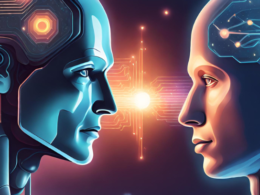Think of machine learning as the flooding river that will change the landscape of employment as soon as it washes over!
Huge changes are already adrift and as a working professional, it is a sink or swim situation!
If you want to ride the wave, you need to be prepared to grab machine learning by the horns. Reading will keep you afloat. Reading a lot will help you surf like a champion.
As a newbie, you can be easily overwhelmed by the sheer size of content available online. If you’re in for the long haul, you know the best tactic is to fall back on the old-school book reading.
We cannot stress the importance of reading books enough to understand the content in-depth as explained by machine learning experts. Picking the right books can also be confusing but we’re here to rescue you from all that.

In this article, you’ll find the following books reviewed for you!
| Book Name | No. of Pages | Price |
| The Hundred-Page Machine Learning Book | 100 | ₹ 5453 |
| Machine Learning For Absolute Beginners | 164 | ₹ 1238 |
| Machine Learning: Ultimate Beginners Guide | 102 | ₹ 690 |
| Machine Learning | 432 | ₹ 458 |
| The Elements of Statistical Learning | 745 | ₹ 2800 |
| Learning From Data | 213 | ₹ 5186 |
| Pattern Recognition and Machine Learning | 738 | ₹ 4000 |
| Machine Learning in Action | 384 | ₹ 2678 |
| Automate This: How Algorithms Came to Rule | 256 | ₹ 965 |
| Python Machine Learning by Example | 254 | ₹ 3473 |
We’ve shortlisted 20 content rich and easy to follow books for you to start reading right away. Let’s take a look at our list!
1. The Hundred-Page Machine Learning Book
This book is a short read typically written for a machine learning newbie. The author touches base on an exhaustive list of topics in a brief and easy manner. In just 100 pages, the reader is exposed to both concepts and equations.
You can read through a few chapters for free and buy or download the entire book once you’re satisfied with what it has to offer. A striking feature about the book is that it comes with an additional wiki page, called companion wiki, where you can look up any doubts or associated topics online.
Author: Andriy Burkov.
Director of Data Science & ML
Gartner.
2. Machine Learning For Absolute Beginners: A Plain English Introduction
Just how it claims, the book focuses on machine learning concepts explained in simple English. The concepts are backed by detailed theory and practical examples and is a great starting point for beginners.
The book assumes the reader is neither a coder nor a statistician and does not have a sophisticated understanding of data in general. However, you need to be invested in machine learning and prompt with web searches to get the best out of this book. The book is not all-exhaustive but is a great fit for your starter kit.
Author: Oliver Theobald.
Technical Writer
Hoffman Agency.
3. Machine Learning: The Ultimate Beginners Guide
Another 100-page wonder, the author explores machine learning from the perspective of a beginner. The book uncovers algorithms and breaks down supervised and unsupervised learning for everyone.
The book connects the theory with real-world developments on the practical front. It is aimed at arming everyone with the skills to navigate through new technology with ease.
Author: Ryan Roberts
Startup & Venture Capital Lawyer
4. Machine Learning
Possibly the most recommended book in the machine learning circle, this page-turner has a comprehensive explanation on machine learning algorithms. The book discusses the math and statistics that go into machine learning algorithms and models.
While you might need to refresh your math before diving into this book, it has been the go-to help manual for machine learning students since 1997. Newer chapters, introduced since the ‘97 edition are available for download here.
Author: Tom Mitchell
Professor
Carnegie Mellon University
5. The Elements of Statistical Learning: Data Mining, Inference, and Prediction
Next on our list is a great mathematical primer for machine learning. This book is widely regarded for its explanations of mathematical concepts however it might be hard to follow for someone with an unsound math background.
The book covers a number of algorithms and provides an in-depth understanding of pattern recognition and statistical learning. That said, you would need a solid foundation of linear algebra to cruise through the book.
Authors: Trevor Hastie. Robert Tibshirani and Jerome Friedman

6. Learning From Data: A Short Course
The book is aptly named as a short course on learning data. The book does not promise to discuss every algorithm but it does explain introductory concepts in a brief and lucid way.
This book is a great way to jump-start your machine learning journey. The focus is more on logic, the questions that lead up to the application of algorithms and less on the said algorithm which makes the book a must-have to understand just how the logic works. If you’re thinking of giving this book a try, you might also want to check out the author’s online lectures to give your learning a boost!
Authors: Y. Abu-Mostafa, M. Magdon-Ismail and Hsuan-Tien Lin
7. Pattern Recognition and Machine Learning
Pattern recognition is an integral part of being adept in machine learning. The book recognizes just how important it is to understand pattern formations in data and is a creamy read for newbies having no previous knowledge of identifying patterns in data. That said, the book is not something you skim through. The topics touched are detailed to the tee with loads of illustrations and applications discussed.
You need time to finish the book. It is one of the best books to understand the Bayesian inference. This book should form a part of your fundamental statistical learning.
Author: Christopher Bishop.
Lab Director,
Microsoft Research.
8. Machine Learning in Action
We discussed a few books with a strong mathematical hold, we now have a book that focuses more on coding. As the name suggests, machine learning in action connects the theory with practical applications of the real world.
The book explains machine learning topics from scratch with the fundamentals of Python. While the book deals less with mathematical concepts, you can always build on those skills using other math-focused books as mentioned in our list. The book has carved its own niche by using edgy examples backed by Python coding to provide its readers with a rich learning experience.
Author: Peter Harrington.
Data Scientist
9. Automate This: How Algorithms Came to Rule Our World
This book discusses the wide spectrum of industries employing machine learning applications and models and explains the algorithms running the show.
The book is amazingly diversified with substantial examples to give you a broad view of the omnipresence of machine learning. The book is a guaranteed fun read in the least and super informative at best. It deals with applications of algorithms in finance, accounting, broadcasting and the music industry. The list isn’t limited here, pick the book to check out what else is in store!
Author: Christopher Steiner.
Staff Writer
Forbes
10. Python Machine Learning by Example
Another leader in distinguished machine learning books, Python machine learning by Example is aptly named.
The book has a hearty appetite for machine learning concepts, illustrations and related code. As a newbie, you’ll find the book directional, clear and palpable. The author has also included personal experiences to make the book all the more relatable.
Author: Yuxi Hayden Liu.
Data Scientist and Writer

This completes our list of go-to books for machine learning buffs. However, there are many disruptive books in this space popular for their stimulating content, originality and innovation. Here are some books that are highly regarded and are creating quite a buzz:
Machine Learning Yearning
Written by the machine learning veteran, Andrew Ng, this book is a must-read once you have a basic understanding of machine learning concepts and algorithms. The book focuses on making algorithms more efficient and time-saving.
There is a lot of subject matter on how to make machine learning projects more organized, identify errors and improve on models. It’s not suitable for newbies despite being colloquial and simplified as it does not explain concepts from the ground up. However, Machine Learning Yearning is a must-have for a machine learning student eventually.
Author: Andrew Ng
Hands-On Machine Learning with Scikit-Learn and TensorFlow
This is a super-comprehensive book that focuses on using Python to build machine learning models and systems. The book also dives into deep learning using Tensorflow and revolves around codes and Jupyter notebooks.
The book is an undeniable catch for intermediate machine learning students. This book isn’t the best choice for total novices as it stresses more on the practical aspects of machine and deep learning and detailed theoretical explanations are overlooked.
Author: Aurélien Géron
Deep Learning with Python
This book is written by the author of the Keras framework himself and as such discusses the basics of deep learning, intuitions and logic with much clarity. Of course, before embarking upon the book, you might need to educate yourself with the basics of machine learning and practice exhaustively.
The book offers conceptual explanations and code implementations for an array of topics in deep learning. Needless to say, the book focuses on Python and might not be suitable for a machine learning newbie.
Author: Francois Chollet
Data Analysis with Open Source Tools
The book stands out from the crowd as it discusses more of how a data analyst’s mind should work rather than the tools and methods to perform said analysis.
The book does not restrict itself to Python and uses a number of open-source tools to demonstrate the working of models. Though enough execution methods are discussed, the book’s primary focus is for readers to understand the right approach to exploring a data-set.
Author: Philipp K. Janert
Machine Learning – A Probabilistic Perspective
This book focuses on statistical learning more than anything else. It is a great starter book if you need to develop your skills from the perspective of probability. The book assumes its readers to understand basic mathematics and statistics and builds on the knowledge by its own contents.
Author: Kevin P. Murphy
This concludes our article on the 10 best machine learning books you absolutely must read as a newbie. We would suggest you try our honorary mentions once your machine learning base has been consolidated. If you have any books on machine learning that greatly helped you and you think we missed out, do write to us in the comments section!







1 comment